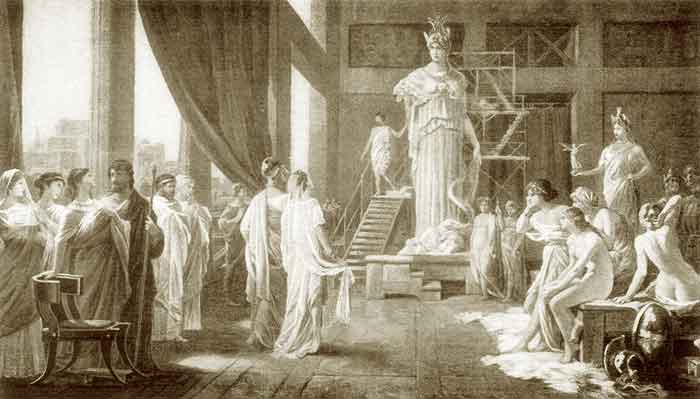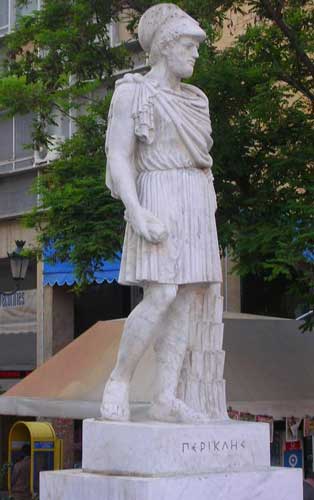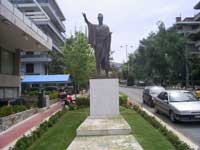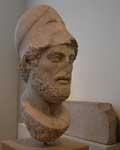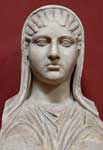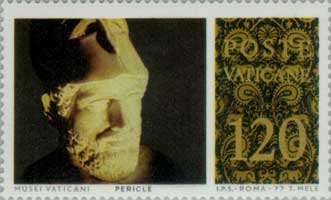|
|
Pericles indeed, by his rank, ability, and known integrity, was enabled to exercise an independent control over the multitude—in short, to lead them instead of being led by them; for as he never sought power by improper means, he was never compelled to flatter them, but, on the contrary, enjoyed so high an estimation that he could afford to anger them by contradiction. Whenever he saw them unseasonably and insolently elated, he would with a word reduce them to alarm; on the other hand, if they fell victims to a panic, he could at once restore them to confidence. In short, what was nominally a democracy became in his hands government by the first citizen. |
Secondary sources
|
Further reading
- Evelyn Abbott (1898). Pericles and the Golden Age of Athens. G. P. Putnam's Sons.
- Roger Brock, Stephen Hodkinson (2003). Alternatives to Athens: Varieties of Political Organization and Community in Ancient Greece. Oxford University Press. ISBN 0199258104.
- Percy Gardner (1902). Ancient Athens.
- A. J. (Arthur James) Grant (1893). Greece in the Age of Pericles. John Murray.
- Jon Hesk (2000). Deception and Democracy in Classical Athens. Cambridge University Press. ISBN 0521643228.
- Donald Kagan (1991). Pericles of Athens and the Birth of Democracy. The Free Press. ISBN 0684863952.
- C. Douglas Lummis (1997). Radical Democracy. Cornell University Press. ISBN 0801484510.
- Josiah Ober (2001). Political Dissent in Democratic Athens: Intellectual Critics of Popular Rule. Princeton University Press. ISBN 0691089817.
- P J Rhodes (2005). A History of the Classical Greek World: 478-323 BC. Blackwell Publishing. ISBN 063122565X.
- Leonard Whibley (1889). A History of the Classical Greek World: 478-323 BC. University Press.
Links
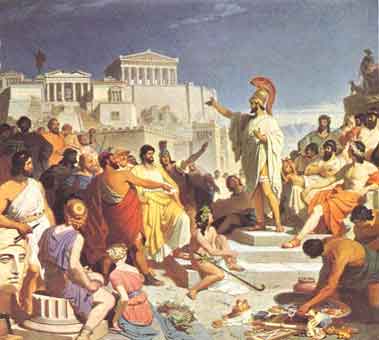
When the orators, who sided with Thucydides and his party, were at one time crying out, as their custom was, against Pericles, as one who squandered away the public money, and made havoc of the state revenues, he rose in the open assembly and put the question to the people, whether they thought that he had laid out much; and they saying, "Too much, a great deal," Then," said he, "since it is so, let the cost not go to your account, but to mine; and let the inscription upon the buildings stand in my name." When they heard him say thus, whether it were out of a surprise to see the greatness of his spirit or out of emulation of the glory of the works, they cried aloud, bidding him to spend on, and lay out what he thought fit from the public purse, and to spare no cost, till all were finished. Plutarch, Pericles
|
Plutarch's Lives of the Noble Greeks and Romans Alcibiades and Coriolanus - Alexander the Great and Julius Caesar - Aratus & Artaxerxes and Galba & Otho |
Retrieved from "http://en.wikipedia.org/"
All text is available under the terms of the GNU Free Documentation License
|
Athenian statesmen | Ancient Greece Aeschines - Agyrrhius - Alcibiades - Andocides - Archinus - Aristides - Aristogeiton - Aristophon - Autocles Callistratus - Chremonides - Cleisthenes - Cleon - Critias - Demades - Demetrius Phalereus - Demochares - Democles - Demosthenes Ephialtes - Eubulus - Hyperbolos - Hypereides - Kimon - Kleophon - Lycurgus Miltiades - Moerocles - Nicias - Peisistratus - Pericles - Philinus - Phocion - Themistocles |
